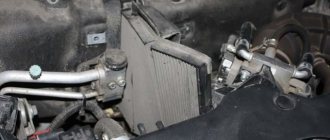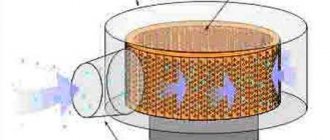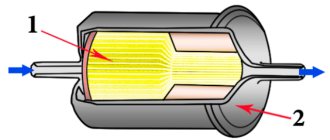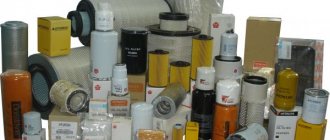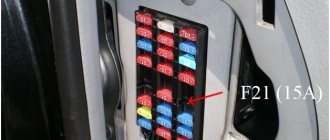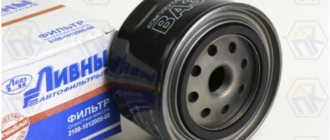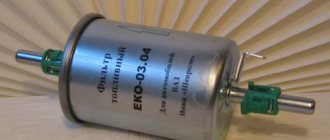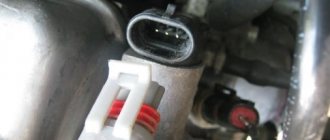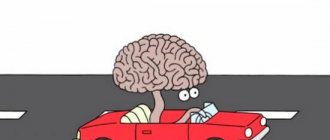Every car owner sooner or later wonders why the fuel consumption of a car has increased? This is a fairly common problem and is often accompanied by some kind of malfunction. But before identifying the reasons for increased fuel consumption, you need to know how to accurately determine whether gasoline or diesel consumption has increased at all and by how much.
To determine the level of fuel consumption, you must perform the following steps:
- Fill the tank full.
- Reset the odometer reading to "0".
- Drive along the highway at a speed of 90 km/h for as many kilometers as possible.
- Add gasoline until the tank is full.
Now you can calculate fuel consumption by dividing the liters spent by the kilometers traveled and multiplying by 100 (gasoline consumption per 100 km).
For example, (6l/90km)*100=6.7l
It is considered quite normal and natural when a vehicle consumes gasoline or diesel to a greater or lesser extent, both when driving and idling, since this greatly depends on the driving style and operating conditions of the vehicle:
- Car load (empty or full of passengers and luggage).
- Distance and place of travel (highway or city).
- Time of year (higher fuel consumption occurs in winter).
- Car defects.
How to determine if fuel consumption is increased
As a rule, each automaker in its documentation defines the so-called “passport” gasoline consumption (fuel consumption standards) for a particular car model with a specific type of engine and gearbox. It should be understood that this consumption according to the passport was obtained under ideal conditions (high quality fuel, complete serviceability of components, systems and assemblies), minimal loads, etc.
In reality, consumption usually differs from the passport value by at least 15-20% upward. Moreover, you need to take into account the individual operating conditions of the car. It is not difficult to guess that driving on the highway at a constant speed will require much less fuel than constant acceleration and stopping in the city.
In turn, the following can be considered an increase in fuel consumption:
- for example, a car in the city always consumed 10-11 liters per 100 km of fuel, fuel was purchased at proven gas stations;
- after refueling at the same gas station and with the same type of fuel, consumption increased by 2-3 or more liters, while the car is operated in exactly the same conditions;
Please note that an increase in consumption to 1 liter is not a sign of overconsumption. The fact is that consumption is influenced by many subtle factors: fuel quality, headlights and electrical equipment on, underinflated wheels, open windows when driving, the condition of air and fuel filters, vehicle load and even outside air temperature.
As a result, it is quite possible to allow an error of up to 1 liter, and the driver may not even notice it. If the consumption has clearly increased by 3-5 liters or more, in this case diagnostics are necessary, since increased fuel consumption is often a sign of a malfunction.
Structural reasons for consumption
To identify such faults, in some cases you can carry out visual diagnostics yourself, and then contact professionals.
Lambda probe
Failure of the oxygen sensor in most cases occurs due to the use of leaded fuel. Residues of lead oxides cover the working part of the assembly. In this regard, the injectors begin to add more gasoline to the fuel mixture. This chain leads to an increased level of CO in the exhaust gases. Often it is by this indicator that you can determine that the lambda probe needs to be replaced or repaired.
Lambda probe location
Computer engine diagnostics can also indicate a non-functioning sensor. In this case, you can simply replace it with a new one. However, this is quite an expensive action.
The approximate cost of a new original lambda probe for a Japanese foreign car will be about $400.
A cheaper option for such repairs is to replace the unit with a Bosch sensor, which is a spare part for VAZ cars.
Candles
Low-quality gasoline has a detrimental effect on the operation of spark plugs in the engine. Replacing them with new ones will help in the fight to reduce fuel consumption. But when purchasing a kit, you need to check for a correctly installed gap.
How to identify low-quality candles
After all, even in branded stores, suppliers can supply low-quality goods. Then the purchase will be useless. Some products can cost up to $40 each.
Filters
Regular car maintenance will help you overcome increased fuel consumption. During this procedure, it is advisable to ensure that all filters required for this period of operation are replaced:
- oil;
- fuel;
- air.
You shouldn’t expect much return from this action, but the positive effect will be noticeable.
Electrical part
Electrical leaks may occur due to contamination of the switch-distributor or high-voltage wires. This affects the quality of combustion of the fuel mixture in the cylinders. Incomplete combustion occurs. Therefore, you can check the electrical circuit for breakdowns. In case of obvious contamination, you can clean or partially replace damaged armor wires.
Catalysts
This element of the fuel system helps combat air pollution. But at the same time the car loses a little power.
Appearance of the catalyst
If the catalyst is faulty or is not in place at all, then this may also be the reason why the car consumes a lot of gasoline.
How to find out fuel consumption in a car
Many cars today are equipped with on-board computers that record average consumption, as well as instantaneous consumption, predict the power reserve based on the available amount of fuel in the tank, etc. At the same time, the data from such on-board systems are considered to be very average.
As a rule, experienced owners of different cars usually record the actual consumption empirically. The most accurate way is to fill the tank completely “before shooting”, drive exactly 100 km and refill the tank with fuel before “shooting”. Based on the amount of fuel being filled, the consumption is calculated, after which more or less accurate data can be obtained in relation to certain driving conditions (highway, city, mixed).
To save money: what are the main sensors that affect fuel consumption in a car?
All mechanisms and systems of a modern car function thanks to the continuous operation of an electronic control unit (ECU), which analyzes the flow of information coming from the controllers. This process is of primary importance for the operation of the power unit and fuel economy. The main sensors monitor the following parameters:
- Coolant temperature.
- The amount of oxygen in the exhaust.
- Throttle position.
- Air rarefaction level in the intake system.
- The amount of air directed into the cylinders.
High fuel consumption: reasons
Having checked all the indirect causes (tire pressure, use of electrical equipment, etc.), you can move on to searching for possible problems.
- You should start small - fuel and air filters. In this case, a dirty air filter or problems with the fuel supply to the engine can cause a disruption in mixture formation, which leads to excessive consumption.
- The next step is to assess the quality of the engine and components. For example, if any roller or drive makes noise when running, this will indicate resistance in rotation and loss of some energy from the motor. For example, a faulty air conditioning compressor or alternator can significantly increase fuel consumption.
- A worn out engine or faulty gearbox/transmission will also cause the engine to lose power and consume more fuel than normal. For example, a slipping clutch will result in some of the torque not being transmitted to the wheels. On many cars, the engine or automatic transmission can even go into emergency mode, as a result, consumption can increase by 80-100%.
- Problems with the ignition system (spark plugs, explosive wires, etc.) often cause improper ignition of the mixture or misfire in the cylinders.
The result is a decrease in the power of the power unit and excessive fuel consumption. Malfunctions in the engine control system (ECM) or failure of the system sensors lead to incorrect readings erroneously affecting mixture formation. - Contaminated injectors or their breakdown, decreased pressure in the injector, “knocked down” carburetor adjustments and other problems with the power system can also cause the mixture to not meet the standard and the engine consumes a lot of fuel.
- Often problems with the lambda probe and catalyst cause high consumption.
If the oxygen sensor is faulty, the car consumes fuel very actively, the fuel mixture may be very rich. By the way, if diesel fuel consumption is increased, special attention should be paid to the particulate filter. We also recommend reading an article about why the engine loses power, dips appear during acceleration, throttle response disappears, etc. From this article you will learn about the main reasons for the loss of power of the power unit, as well as what to look for when diagnosing the motor. - Wheel bearings and seizing calipers also often cause increased fuel consumption. For example, it often happens that the wheel bearings are not in order and the car loses its “rolling power”. Also, after braking, the pads are not completely retracted from the discs or drums. In turn, this “slows down” the car and you have to press the gas harder to overcome the resistance.
- Another reason why mixture formation is disrupted is air leakage at the inlet. Excess air often leads to engine malfunctions and increased fuel consumption.
- The use of “viscous” oils that are unsuitable for the engine, especially in winter, can cause resistance to rotation. In some cases, such oil not only harms the engine, but also causes increased fuel consumption.
How to reduce fuel consumption on an injector?
how to reduce fuel consumption using an injector is always relevant . This is often caused by clogged injector nozzles. This can be seen from the following signs:
- Increased engine speed;
- Loss of acceleration dynamics by the car;
- Slowing down gear shift modes.
Wear of the gas distribution mechanism may also be one of the reasons for increased fuel consumption. In this case, the injector receives a command from the on-board electronics, which leads to the fact that the mixture contains excess fuel.
Incorrect adjustments of the on-board computer sensors (throttle valve, oxygen, etc.) distort information about the engine condition. As a result, the engine can operate in emergency mode with increased fuel consumption.
The reasons for increased fuel consumption on injection engines may be burnout and destruction of the catalyst. This is a signal that:
- Engine injectors are dirty;
- Spark plugs require replacement;
- The electronic controller that controls the motor is faulty;
- The automatic gearbox is faulty.
Such situations may be the reason for increased fuel consumption of the VAZ 2114 and other domestic cars.
Recommendations
In the case where high gas consumption is noticed on a car, the reasons may be different. In some cases, diagnostics and repairs are not difficult, since it is enough to clean the injectors, replace filters, change a faulty sensor, install a lambda decoy, or simply inflate the wheels. The search for the problem itself is also often simplified, since a “check” lights up on the panel; errors in the memory of the control unit allow you to quickly localize and eliminate the malfunction.
However, in practice there are also often cases where consumption increases gradually and without visible signs. For example, wear on piston rings or cylinder walls leads to a drop in compression. In this case, the engine can operate even more or less stably, but the energy of the burning fuel begins to be wasted, which leads to high fuel consumption.
We also recommend reading the article about why engine compression drops. From this article you will learn what compression in the engine affects, as well as how to measure engine compression.
For this reason, it is necessary to know what the rated gasoline or diesel fuel consumption is for a particular model, as well as what the actual consumption is. Further, if the consumption is increased by 30-40% or more relative to the actual fuel consumption or is clearly much higher than the passport one, and no obvious reasons are found, in this case the car requires comprehensive professional diagnostics.
Why has gasoline consumption increased? Causes and solutions
Drivers often encounter this problem: the car begins to consume more fuel than usual. It’s one thing when this difference is an insignificant volume, which is measured in milliliters. This situation will not seriously hit the wallet and the car owner may not even pay attention to it.
But what to do if gasoline consumption has increased by 1-3 liters? Clearly there is something wrong with the car. And further operation of the vehicle will lead to additional financial expenses. Then let's figure out why fuel consumption increases? What are the reasons for the increased consumption of fuel and lubricants?
Common reasons
There are many reasons for increased fuel consumption. They are usually divided into two groups:
— Technical problems in the car. This is all that is associated with wear of components, incorrect or insufficiently good operation of units. The solution to the problem here can only be repair or replacement of parts.
— Seasonal or human factor. Fuel consumption may increase due to an aggressive driving style, during cold weather, overload, etc. In this case, no repairs are required, but it is necessary to make adjustments to the operation of the machine.
Depending on one reason or another for the increase in gasoline consumption, a method for solving the problem is selected. Therefore, let's look at each case in more detail.
Problems affecting fuel consumption
1. Failure of sensors in the car. If the sensors begin to work incorrectly, fuel consumption increases significantly. The culprit may be the throttle position sensor (TPS), temperature sensor, oxygen sensor and air flow sensor. Incorrect operation of the electronics leads to the fact that the engine begins to receive either a “lean” fuel-air mixture, resulting in loss of power, or a “rich” one, when consumption increases significantly. Therefore, it is imperative to check the sensors for serviceability. This can be done at a service station.
2. Worn spark plugs. Replacing spark plugs is one of the ways to combat increased fuel consumption. They can fail due to low-quality gasoline or simply as a result of prolonged operation. Place only high-quality candles from trusted manufacturers, purchased in reputable stores.
3. Contamination of engine injectors. Over time, the injectors become dirty and if they are not cleaned, the consumption increases. They don't atomize the fuel properly, and the gasoline leaks out. To solve this problem, you need to clean the injectors or replace them with new ones.
4. Faulty catalyst. During normal operation of all systems, the catalyst is a fairly durable element. However, low-quality gasoline makes it unusable. In addition, prolonged work may eventually knock it out. Such a knocked-out catalyst gives the effect of increasing dynamics or power, but gasoline consumption increases very seriously. By the way, some drivers deliberately knock out the catalyst.
5. Old filters. It is worth checking whether the filters are clogged: fuel, air and oil. If they are replaced, fuel consumption will decrease.
6. High-voltage wires (or distributor) are broken. Due to problems with the wiring, electricity leaks, resulting in the mixture not burning enough. Therefore, it is worth paying attention to the wiring.
7. Increased idle speed. Check to see if the engine idle speed is too high. They also affect how much your car eats (especially in city driving).
8. Incorrect ignition timing. Ignition advance is the ignition of the fuel-air mixture in the engine cylinder by a spark plug before the piston reaches top dead center.
Human and seasonal factors
If breakdowns and malfunctions in the car are repaired in a timely manner, then you will not encounter such a problem as additional expenses for refueling the gas tank. But there are factors that depend on you or are caused by objective reasons. Let's look at them now.
1. Aggressive driving style. If you like to drift, suddenly break off at traffic lights, often change lanes in traffic, overtake other cars, etc., then you spend much more fuel than when driving calmly. Therefore, if gasoline costs begin to hit your budget, think about changing your driving style.
2. Cold season. The onset of winter and cold weather always increases consumption. The car has to be warmed up, which means idling. In addition, driving on a poorly warmed-up engine also increases gasoline consumption. And simply replacing summer tires with winter tires results in extra spending on fuel and lubricants. After all, winter tires are larger and heavier, which means, albeit slightly, the load on the engine increases.
3. Operation of electrical appliances in the car. Constant operation of the stove at maximum power also leads to additional expenses on gasoline. Any electronics, including the radio, power steering, “takes away” engine power and, therefore, increases consumption, although not too significantly. By the way, this also applies to headlights that are always on.
4. Poor quality of gasoline. Unfortunately, buying low-quality gasoline at a gas station can be as easy as pie. Such fuel will not provide the necessary power and will burn faster. Therefore, choose reliable gas stations. In addition, it is known that a car will travel more kilometers on 95 gasoline than on 92 gasoline. It's also a matter of quality here.
5. Significant mileage of the car. Over the years, the technical condition of the car, of course, gets worse. And when components and assemblies of a car wear out, an increase in fuel consumption is natural.
6. Transportation of goods. If you use a car to transport various cargoes or a large number of passengers, you should know the following. For every 100 kilograms of additional weight, approximately 10% of gasoline consumption occurs. The situation is even worse with a loaded trailer. So there can only be one solution here, free up space in the car.
7. Underinflated tires. We have already talked about what tire pressure should be. When tires are flat, tires wear out faster and gasoline is consumed more.
8. Poor aerodynamic performance. With a good run, the car consumes less fuel. Therefore, it is important to ensure that the car rolls easily. This means that it is not recommended to drive with the windows open at high speed (more than 50 km per hour), load the roof rack, etc. In addition, do not overtighten the wheel bearings to make the car roll easier.
Solving the problem of increased consumption
To solve the problem of increased fuel consumption, you first need to establish the reason that caused this situation. Analyze - when exactly did the changes occur and what could have contributed to this?
If deficiencies in the technical condition of the car are to blame, then you should definitely eliminate them. Go to the service station. In any case, it would be a good idea to check all components and assemblies of the car for serviceability. By replacing worn components, you may end up significantly reducing your fuel consumption.
That is, by spending money on spare parts, you will save on gasoline.
Take care of your car and you will only enjoy driving. Good luck on the road!
A clogged fuel system is the cause of increased consumption.
A common cause of changes in engine operation is clogging of the injector or carburetor, as well as fuel filters, lines and other elements of the system for supplying gasoline or diesel fuel to the engine. Situations can be different, even the main cleaning filter in the tank is clogged. In this mode of operation, the car does not receive the required amount of fuel; the computer forces the gas pump to supply more gasoline to the chambers, which causes increased consumption. Possible solutions to the problem are as follows:
- diagnostics and cleaning of the injector, purge of injectors or carburetor maintenance;
- replacing fuel filters and cleaning lines;
- changing the usual gas station, experimental use of other fuel;
- complete inspection of the fuel supply system, cleaning of the gasoline tank;
- full check of the car at the service station on special stands and computers.
If you have a modern car, computer diagnostics will answer all the necessary questions. All that remains is to buy the necessary spare parts and entrust the repair work to specialists. Be sure to react to increased fuel consumption and other indicators of problems in your car, because only the correct reaction and quick actions will help eliminate the problem at the very beginning, without spending too much money and time on it.
